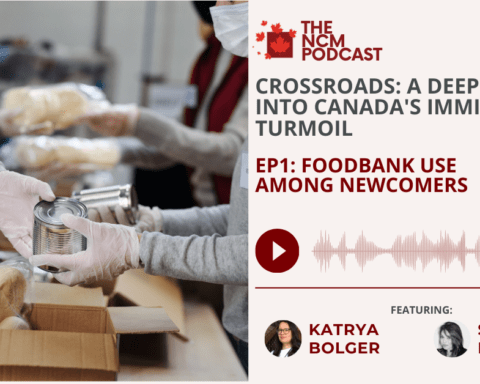They came, they saw, they conquered against all odds. Others went back, defeated.
Don’t be quick to cheer the former and sneer at the latter; more often than not, immigrants to Canada who head back end up making millions elsewhere.
So what’s to blame for their departure? Is it malfunctioning planets, miserable resumes, sub-zero Martian temperatures that take the fun out of job hunting or all of the above?
Statistics Canada says that one in three Canadians leave the country within 20 years of arrival. Yet, close to 50 per cent of the country’s millionaires are reportedly new immigrants or first-generation whiz kids with at least one parent born across the border.
You have to raise your tuque to them. Only a fraction of this envious lot is partying on inherited wealth. Most of them are self-made successes. How did they do it?
New Canadian Media spoke to five immigrants to Canada to explore the differences between those who stayed, and those who chose to leave.
Does Higher Education Pay Off Better?
Pranay Sen* says no. A microbiologist who studied at two premier Canadian universities, he followed his parents to Mississauga from South East in 2002. He started off as a junior scientist in a reputable firm. However, within two years he realized there was not much scope for growth.
“Canada could not offer my son better opportunities (in the pharmaceutical industry) whereas [a country in Europe] gave him the break he needed,” explains Pranay’s mother. “Most of his friends remained unemployed, which further discouraged him to linger on here.” Pranay moved to the European country where he continues to make major strides in his career.
They migrated to Canada from Jakarta in 2005 in search of ‘clean air, structured society and affordable international education for our children.’ Within a year and a half of puffing oxygen, they returned to Jakarta’s fumes.
Many disillusioned souls leave within the first year of arrival. Jay and Christina D’Souza have a similar story. They migrated to Canada from Jakarta in 2005 in search of “clean air, structured society and affordable international education for our children.” Within a year and a half of puffing oxygen, they returned to Jakarta’s fumes.
The first few days in Canada were decisive. The security guard at their serviced apartment (fully furnished with hotel-like amenities) had more weight in his brains than biceps. He had a PhD in microbiology, but in his three years in Toronto, he never got a break that did justice to his degree. Jay got a job that paid his bills, but it could not give him the lifestyle he left behind.
“It did not appear that people who lived here longer were better off than me. There are exceptions, but our struggle was not worth the effort,” he explains.
When Mags Mano moved to Brampton from Indonesia, Asia was booming, while Canada was hit with the recession. She settled down with her Canadian husband, an immigrant from Iran.
They had every reason to stay on. Mags did well for herself working for the Canadian government, moving on to jointly own an automotive business with her husband. But, in 2014, they gave it all up and headed back to Jakarta.
“The Canadian economy was slowing down in 1990 to ’91, while the other side of the world was booming,” Mano reasons. “We thought it was time to look into more lucrative investment opportunities where the going was good.” For her, the harsh Canadian winter also played villain.
It took her no time to settle down as a senior manager in a relocation company back in her home country.
Can Better Timing Lead to Greater Wealth?
Those who arrived when labour market conditions were favourable seem to have the best reasons to celebrate now. Many own assets worth millions, gained through business enterprises and real estate investment.
For Neerav and Preeti Sharma who migrated from India in 2001, pre-planning did the trick. High levels of pollution wreaked havoc on their daughter’s health. It was time to look for greener pastures.
“You may not start at the top, but hard work rewards well with many opportunities.” – Neerav Sharma
Neerav was reluctant to leave his prestigious job in Delhi, so his wife went ahead first. Luckily for her, she found a job, home and enough greenery to have her husband join her soon after.
“I tapped into the employment resource centres for new immigrants and found my first job in Seneca College (in Toronto),” she says. Preeti continued to build her skills and moved up rapidly. Today, she is Operations & Student Retention Manager in the School of Communications, Media & Design.
Neerav arrived in 2003 through a company transfer. He was the only non-white employee in his company then and says he believes it is imperative to have good interpersonal skills and networking abilities to succeed in Canada. “You may not start at the top, but hard work rewards well with many opportunities,” he promises.
Whatever their story, all achievers agree that there is no escaping the struggle in the initial years.
For Paul Yee, an executive producer of TV commercials from Hong Kong, investing in real estate was his key to success. He came to Canada for a family reunion and never went back. He worked hard, owned a company, built assets through real estate investment and encourages newcomers to do the same.
Whatever their story, all achievers agree that there is no escaping the struggle in the initial years.
Can We Enrich the Economy by Letting Skilled Immigrants Go?
Canada has the largest number of immigrants per capita in the world. But are they given equal career opportunities as those born here?
Statistics Canada says that the first four years of the new millennium recorded more out-migrants from Canada than immigrants.
“For the United Kingdom, the emigrant-to-immigrant ratio was 1.6 Canadians leaving for every Briton entering Canada,” the study says. However, the largest ratio was between the United States and Canada, with Canada sending 11.3 emigrants for every U.S. immigrant.
According to a 2012 news report in The Globe and Mail, there is severe lack of skills in the secondary cities of Alberta, Saskatchewan, Ontario and Atlantic Canada. “This shortage (of people power) is a drag on Canada’s potential to innovate and compete into the future,” says the article.
For a stronger economy and uniform development countrywide, can the federal government afford to lose skilled immigrants to other countries? That remains the million-dollar question.
* Publisher’s note: some names in this reporting have been changed to respect the privacy and career prospects of the subjects.
Collective Convenor & Communications Planner - Joyeeta Ray is a multimedia journalist, internationally awarded digital content specialist, and children’s books author, based in Toronto. Born in India, she brings over two decades of advertising and journalism experience across seven countries to Canada. Joyeeta started her journalistic career in Jakarta, led an editorial team in Bangkok, and is a student of Multimedia Journalism from The University of Toronto. She is an enthusiastic NCM-CAJ member, actively involved in amplifying new Canadian voices as NCM’s Convenor, Communications Planner, Mentor, and Reporter.





